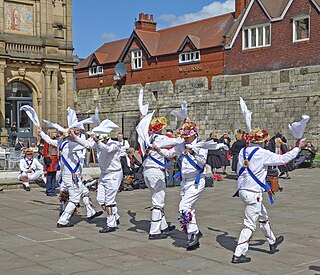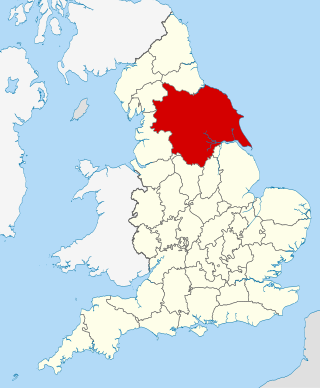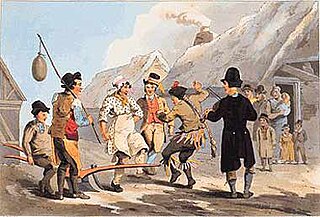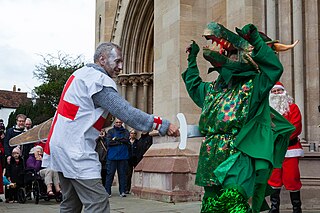
Cross-dressing is the act of wearing clothes traditionally or stereotypically associated with a different gender. From as early as pre-modern history, cross-dressing has been practiced in order to disguise, comfort, entertain, and express oneself.
Costume is the distinctive style of dress or cosmetic of an individual or group that reflects class, gender, profession, ethnicity, nationality, activity or epoch. In short costume is a cultural visual of the people.

Morris dancing is a form of English folk dance. It is based on rhythmic stepping and the execution of choreographed figures by a group of dancers in costume, usually wearing bell pads on their shins and/or shoes. A band or single musician, also costumed, will accompany them. Sticks, swords, handkerchiefs, and a variety of other implements may be wielded by the dancers.

Japanese traditional dance describes a number of Japanese dance styles with a long history and prescribed method of performance. Some of the oldest forms of traditional Japanese dance may be among those transmitted through the kagura tradition, or folk dances relating to food producing activities such as planting rice and fishing, including rain dances. There are large number of these traditional dances, which are often subfixed -odori, -asobi, and -mai, and may be specific to a region or village. Mai and odori are the two main groups of Japanese dances, and the term buyō (舞踊) was coined in modern times as a general term for dance, by combining mai (舞) and odori (踊).

Tomboy is a term used for girls or young women with masculine traits. It can include wearing androgynous or unfeminine clothing and engaging in physical sports or other activities and behaviors usually associated with boys or men.

Kathakali is a traditional form of classical Indian dance, and one of the oldest theater forms still practiced. It is a "story game" genre of art, but one distinguished by the elaborately colourful make-up and costumes of the traditional male actor-dancers. It is native to the Malayalam-speaking southwestern region of Kerala and is almost entirely practiced by Malayali people.

Weapon dances incorporating swords or similar weapons are recorded throughout world history. There are various traditions of solo and mock-battle (Pyrrhic) sword dances from Africa, Asia and Europe. Some traditions use sticks or clubs in place of bladed weapons, while most modern performers employ dulled replications to avoid injury.

Rapper sword is a variation of sword dance unique to Northumberland and County Durham. It emerged from the pit villages of Tyneside and Wearside, where miners first performed the tradition.

The Long Sword dance is a hilt-and-point sword dance recorded mainly in Yorkshire, England. The dances are usually performed around Christmas time and were believed to derive from a rite performed to enable a fruitful harvest.
Drag is a performance of exaggerated femininity, masculinity, or other forms of gender expression, usually for entertainment purposes. Drag usually involves cross-dressing. A drag queen is someone who performs femininely and a drag king is someone who performs masculinely. Performances often involve comedy, social satire, and at times political commentary. The term may be used as a noun as in the expression in drag or as an adjective as in drag show.

Plough Monday is the traditional start of the English agricultural year. While local practices may vary, Plough Monday is generally the first Monday after Epiphany, 6 January. References to Plough Monday date back to the late 15th century. The day before Plough Monday is referred to as Plough Sunday, in which a ploughshare is brought into the local Christian church with prayers for the blessing of human labour, tools, as well as the land.
The Dancing England Rapper Tournament (DERT) is a continuation of the most significant rapper sword dance competitions that were held in Newcastle upon Tyne, England, the centre of the coalfields where the dance originated. The modern annual weekend event, held at different venues in the UK, brings together rapper teams and sword dancers from around the country and occasionally abroad.

Matachines are a carnivalesque dance troupe that emerged in Spain in the early 17th century inspired by similar European traditions such as the moresca. The term danza de matachines is also used to refer to their characteristic dance and music. The dance was documented in the 1642 treatise Discursos sobre el arte del dançado by Juan de Esquivel Navarro. The tradition was imported into Latin American countries such as Mexico and Peru.

Big Bad Mouse is a British stage play and theatrical comedic farce by Phillip King and Falkland L. Carey. Although not specifically written for Jimmy Edwards and Eric Sykes, it became a vehicle for the British comedy actors and has been revived many times with other stars right up to 2008.
Bhānds are the traditional folk entertainers of India, Pakistan, Bangladesh, and Nepal. In India and Nepal, the Bahand are now an endogamous Muslim community, which is no longer involved in their traditional occupation of folk entertainment. They include actors, dancers, minstrels, storytellers and impressionists.

The Earsdon Sword Dance is a traditional English folk dance performed by the Royal Earsdon Sword Dancers. As the name suggests, they are based in Earsdon, Northumberland, England, a village which is surrounded by other villages including East Holwell, West Holywell and Backworth, while the resort town of Whitley Bay itself is only 3 miles (2 km) away.
Prof William Fisher Cassie FRSE CBE LLD was a British civil engineer and academic. He was a noteworthy author on building structure. He was an expert on soil mechanics and a strong advocate of underground transport systems.
Dancing England was a series of showcase traditional dance concerts held at the Derby Assembly Rooms from 1979 to 1987. They were devised and curated by Phil Heaton and John Shaw, members of the Black Cap Sword Dancers, and two very notable characters on the Nottingham and Derby folk and dance scene of the 1970s. Dancing England was set up to showcase the best of traditional dance in the UK, along with unique and/or interesting folk customs to celebrate the UK's wide cultural heritage.

Mummers' plays are folk plays performed by troupes of amateur actors, traditionally all male, known as mummers or guisers. Historically, mummers' plays consisted of informal groups of costumed community members that visited from house to house on various holidays. Today the term refers especially to a play in which a number of characters are called on stage, two of whom engage in a combat, the loser being revived by a doctor character. This play is sometimes found associated with a sword dance though both also exist in Britain independently.
The Goathland Plough Stots are a team of Long Sword Dancers based in the village of Goathland, North Yorkshire, England. The traditional dance that they perform had died out by the start of the twentieth century but was revived in 1922. The team were expelled from the Morris Ring for allowing women to be trained in the art of the dance, the tradition being that it is a male-only dance. The Goathland Plough Stots dance is recognised as one of the oldest in England, with a history dating back more than a thousand years.












